In a recent post, I suggested things that might be able to keep you at a good, healthy weight. In case you're wondering if they were just a figment of my imagination, I'm here to tell you the answer.
No, they're not.
There are good, legit reasons they work.
Eating right is a delicate balance. You want to eat enough to nourish and fill you up, but not so much that you gain excess weight. There are so many factors that impact your weight. Here are the ones you can control.
(Don't) Snack right out of the container/bag/box. If you do, you'll quickly lose track of just how much you're eating. Before you know it, that entire bag/box of popcorn/pretzels/cookies is going, going, gone.
(Don't) Eat—and chew—quickly. If you do, you won't have time to enjoy your food. Slowing down will help you avoid overeating and help you pick up on your body's voice that says, "I've had enough." Chewing also helps break your food down into smaller particles that are more easily digested.
(Don't) Comfort yourself with food when you're stressed. It might feel good—for the moment—but after that moment passes, you're likely to be left with more stress because you are berating yourself for eating so much. So the stress still remains, or worse, grows.
(Don't) Skip breakfast. Research shows that breakfast eaters consume fewer calories throughout the day; in fact, they even lose weight. Skip this important meal and you're likely to be starving by mid-morning, making up for the skipped meal—and more.
(Don't) Swap your water for diet sodas, juices and energy drinks. There's research that suggests that drinking two 8-ounce glasses of water before each meal (while also cutting back on food portions) may help you lose weight and keep that weight off for at least a year. And although the research on drinking diet soda is inconclusive (some says makes you crave sweets more and is bad for your health, while other studies say it's OK to drink diet sodas), why not stay safe and stick with water? After all, it's natural and has no chemicals.
(Don't) Go to a party hungry. Instead, have a small healthy snack about an hour before you go—hummus and carrots or cheese with whole-grain crackers or an apple are good choices. This way, you won't be tempted by the greasy, fattening hors d'oeuvres you'd never eat under normal circumstances but will eat if you've arrived ravenous.
(Don't) Eat while you're driving/reading/watching TV. (Or basically, whenever you're distracted by doing something else.) If you do, you'll lose track of how much, or even what, you've eaten. Eating mindfully helps you stay aware of your eating habits and truly enjoy your food.
(Don't) Use big plates instead of smaller ones. It's simple: the bigger the surface, the more you're likely to fill it. Our eye just doesn't like seeing empty spaces on a plate. And chances are great that a small(er) plate of food will do you just fine.
Stop eating before you're full. The brain is a funny thing when it comes to food—it's slow to catch up to the stomach. Your stomach feels full for about 10 to 20 minutes before that message reaches your brain. Better to stop when you're about 70 percent full; chances are you'll feel 100 percent satisfied in just a few minutes.
If something is healthy, eat more of it. Olive oil is healthy. So are things like nuts and avocados. But they're just not healthy: they're also highly caloric. So watch your portions, even if you are eating a healthy food. A tablespoon of olive oil contains 119 calories; one cup of sliced almonds, 529 calories; half an avocado, roughly 140 calories.







